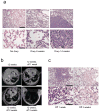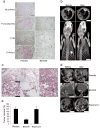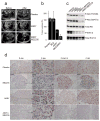Effective use of PI3K and MEK inhibitors to treat mutant Kras G12D and PIK3CA H1047R murine lung cancers
- PMID: 19029981
- PMCID: PMC2683415
- DOI: 10.1038/nm.1890
Effective use of PI3K and MEK inhibitors to treat mutant Kras G12D and PIK3CA H1047R murine lung cancers
Abstract
Somatic mutations that activate phosphoinositide 3-kinase (PI3K) have been identified in the p110-alpha catalytic subunit (encoded by PIK3CA). They are most frequently observed in two hotspots: the helical domain (E545K and E542K) and the kinase domain (H1047R). Although the p110-alpha mutants are transforming in vitro, their oncogenic potential has not been assessed in genetically engineered mouse models. Furthermore, clinical trials with PI3K inhibitors have recently been initiated, and it is unknown if their efficacy will be restricted to specific, genetically defined malignancies. In this study, we engineered a mouse model of lung adenocarcinomas initiated and maintained by expression of p110-alpha H1047R. Treatment of these tumors with NVP-BEZ235, a dual pan-PI3K and mammalian target of rapamycin (mTOR) inhibitor in clinical development, led to marked tumor regression as shown by positron emission tomography-computed tomography, magnetic resonance imaging and microscopic examination. In contrast, mouse lung cancers driven by mutant Kras did not substantially respond to single-agent NVP-BEZ235. However, when NVP-BEZ235 was combined with a mitogen-activated protein kinase kinase (MEK) inhibitor, ARRY-142886, there was marked synergy in shrinking these Kras-mutant cancers. These in vivo studies suggest that inhibitors of the PI3K-mTOR pathway may be active in cancers with PIK3CA mutations and, when combined with MEK inhibitors, may effectively treat KRAS mutated lung cancers.
Figures




Comment in
-
Targeting RAS and PI3K in lung cancer.Nat Med. 2008 Dec;14(12):1315-6. doi: 10.1038/nm1208-1315. Nat Med. 2008. PMID: 19057554 No abstract available.
References
-
- Samuels Y, et al. High Frequency of Mutations of the PIK3CA Gene in Human Cancers. Science. 2004 - PubMed
-
- Ji H, et al. The impact of human EGFR kinase domain mutations on lung tumorigenesis and in vivo sensitivity to EGFR-targeted therapies. Cancer Cell. 2006;9:485–95. - PubMed
-
- Li D, et al. Bronchial and peripheral murine lung carcinomas induced by T790M-L858R mutant EGFR respond to HKI-272 and rapamycin combination therapy. Cancer Cell. 2007;12:81–93. - PubMed
-
- Perl AK, Tichelaar JW, Whitsett JA. Conditional gene expression in the respiratory epithelium of the mouse. Transgenic Res. 2002;11:21–9. - PubMed
Publication types
MeSH terms
Substances
Grants and funding
- P20 CA090578/CA/NCI NIH HHS/United States
- K08 AG024004/AG/NIA NIH HHS/United States
- U24 CA092782/CA/NCI NIH HHS/United States
- R01 CA137008/CA/NCI NIH HHS/United States
- U24-CA092782/CA/NCI NIH HHS/United States
- P01 CA117969/CA/NCI NIH HHS/United States
- R01 AG2400401/AG/NIA NIH HHS/United States
- K08 CA120060/CA/NCI NIH HHS/United States
- R37 GM041890/GM/NIGMS NIH HHS/United States
- R01 GM041890/GM/NIGMS NIH HHS/United States
- P50 CA090578/CA/NCI NIH HHS/United States
- P01 CA089021/CA/NCI NIH HHS/United States
- P50 CA127003/CA/NCI NIH HHS/United States
- R01 GM056203/GM/NIGMS NIH HHS/United States
- R01 GM036624/GM/NIGMS NIH HHS/United States
- R01 CA122794/CA/NCI NIH HHS/United States
- K08 CA120060-01/CA/NCI NIH HHS/United States
- R01 GM41890/GM/NIGMS NIH HHS/United States
LinkOut - more resources
Full Text Sources
Other Literature Sources
Medical
Molecular Biology Databases
Miscellaneous

